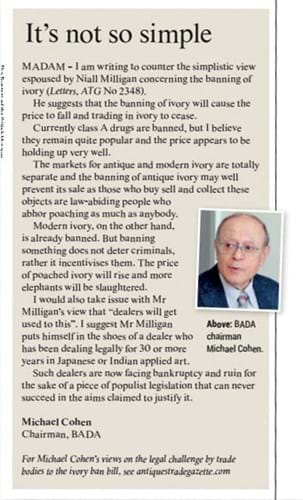One can only conclude that this legislation is not only ill-thought-out, but a purely opportunistic move by the interested parties in wanting to get their name in the press and win votes. Now that those politicians have started this absurd process, they will leave everybody else to pick up the pieces.
As Mr Cohen states, there is already legislation in place to counter the illegal trade in modern ivory. These new proposals contained in the bill will not do the slightest thing to stop the trade in poached ivory. They will, however, potentially destroy large quantities of artworks and put many dealers out of business.
Another ATG correspondent the other week also highlighted the vast irregularities in the votes cast in favour of the ban. The huge number of identical email votes would, in most cases, warrant an investigation of the whole process. However, because there is a political agenda behind the ban, nobody is interested in querying this.
As an exhibitor at Masterpiece said to me last week, ‘well that is a funny coincidence, isn’t it!’
Christopher Richardson
Brighton
Living in ‘ivory towers’
MADAM – Having studied the subject of antique ivory, and collected it for many years, it seems to me that Michael Cohen, BADA chairman, is unaware that his organisation, together with LAPADA and SOFAA, appear to live in an ivory tower, so to speak.
Not only have they been asking all the wrong questions, but they are posing them too late.
A dose of practical reality now needs to be injected into the proceedings.
The chance of preventing an ivory bill has evaporated. There is, however, a win-win solution, which will not only protect our priceless antiques heritage, but which will also leave the path open to protect the present-day elephant.
So far as turn-of-the-century and earlier ivory is concerned – genuine antiques – the elephant has long gone, but its legacy remains, and it should remain. Under the proposed new law, virtually all antique ivory will become worthless, as it cannot be traded, and much of it will tragically be thrown away, or destroyed, which disrespects the elephant’s memory.
However, by means of a simple, single amendment, sense will prevail.
The trade bodies should discard the lawyers and organise themselves into a sensible arrangement, which they put to government, whereby the antiques trade urgently creates a body specifically to issue certificates of authenticity for ivory which, in their expert opinion, is over 100 years old, whether the object consists of 10% or 100% of ivory.
Only these objects will be allowed to be bought and sold; trading in anything more modern becomes illegal.
Gavin Littaur
London NW4
Not exempt from moral choices
MADAM – We write in response to BADA chairman Michael Cohen’s letter (ATG No 2349), challenging the proposed ivory ban bill.
Mr Cohen pleas for the dealers which are facing ‘bankruptcy’, but how many dealers rely on the sale of ivory items for their entire or most of their revenue? I would be very interested in a number on this.
We all have to make concessions to changing legislation over our careers and surely in a civilised world, it is not acceptable to trade in endangered animal body parts.
The fashion world has adjusted to the legislation of trading in animal furs, why not the ivory dealer? Mr Cohen’s analogy with banning class A drugs is ludicrous.
Ivory items in museums are often wonderful and certainly historic. They just should have no monetary value attached. Items could be donated, but not sold.
If an item has no monetary value, the demand will surely diminish both here and in Asia over time, and the impact on the endangered species will surely improve.
The antiques trade is not exempt from moral choices and we agree with your headline on Mr Cohen’s letter: ‘It is not so simple’.
Paul and Karen Rennie Rennies Seaside Modern Folkestone













